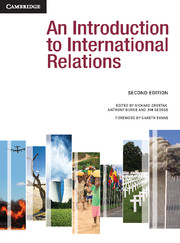Book contents
- Frontmatter
- Contents
- Tables, Figures and Boxes
- Contributors
- Preface and acknowledgements
- An Introduction to International Relations: The origins and changing agendas of a discipline
- 1 Theories of International Relations
- 1 International Relations Theory in an Age of Critical Diversity
- 2 Realism
- 3 Liberalism
- 4 Marxism and Critical Theory
- 5 Feminism
- 6 Postmodernism
- 7 Constructivism
- 8 Theories of Global Justice
- 2 The Traditional Agenda
- 3 The New Agenda
- Glossary of Terms
- Bibliography
- Index
- References
3 - Liberalism
from 1 - Theories of International Relations
- Frontmatter
- Contents
- Tables, Figures and Boxes
- Contributors
- Preface and acknowledgements
- An Introduction to International Relations: The origins and changing agendas of a discipline
- 1 Theories of International Relations
- 1 International Relations Theory in an Age of Critical Diversity
- 2 Realism
- 3 Liberalism
- 4 Marxism and Critical Theory
- 5 Feminism
- 6 Postmodernism
- 7 Constructivism
- 8 Theories of Global Justice
- 2 The Traditional Agenda
- 3 The New Agenda
- Glossary of Terms
- Bibliography
- Index
- References
Summary
Introduction
This chapter discusses a political theory, long present as one of the traditions of thought about international relations, which has come to the fore in the discipline since the end of the Cold War. Understanding liberalism requires acquaintance with the historical context in which the political arguments for freedom and toleration were first enunciated. After providing a brief survey of some key liberal tenets and the manifestation of these tenets in international institutions and foreign policies, the chapter considers the way that contemporary liberal theories of international relations (IR) have developed along empirical and normative trajectories.
Liberalism
Liberalism is often seen as the characteristic political philosophy of the modern West. Its central principles – freedom, (human) rights, reason, progress, toleration – and the norms of constitutionalism and democracy are deeply embedded in Western political culture. Nonetheless, liberal theories of IR were until recently disdained as utopian, by IR scholars no less than by diplomats. The two world wars and the Cold War seemed to bear out the realist thesis that the international milieu was inevitably subject to the harsh imperatives of power politics.
- Type
- Chapter
- Information
- An Introduction to International Relations , pp. 48 - 61Publisher: Cambridge University PressPrint publication year: 2011

